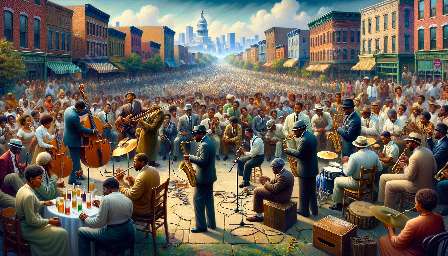The evolution of jazz and blues music over the centuries has been shaped by a myriad of influences, each contributing to the development and growth of these iconic musical genres. From historical, social, and cultural factors to the influence of individual musicians and technological advancements, the evolution of jazz and blues has been a rich tapestry of influences that have shaped the music into what it is today.
Historical and Social Influences
One of the major influences on the evolution of jazz and blues music is the historical and social context in which these genres emerged. Both jazz and blues have deep roots in African American history, stemming from the experiences of slavery, segregation, and the struggle for civil rights. The profound impact of these experiences on the music is evident in the themes and emotions expressed in jazz and blues songs.
Cultural Impact
The diverse cultural landscape of the United States has also played a pivotal role in shaping jazz and blues music. The fusion of African rhythms, European harmonies, and indigenous musical styles created a unique cultural melting pot that gave birth to jazz and blues. The migration of African Americans from the rural South to urban centers during the Great Migration further influenced the development of these genres, as musicians from different regions brought their own musical traditions and styles to the burgeoning jazz and blues scenes.
Individual Musicians
The influence of individual musicians cannot be overstated in the evolution of jazz and blues. Iconic figures such as Louis Armstrong, Duke Ellington, Billie Holiday, Robert Johnson, and B.B. King have left an indelible mark on the music, shaping its direction and inspiring generations of musicians to come. Through their innovations in improvisation, songwriting, and instrumentation, these artists have propelled jazz and blues forward, continually pushing the boundaries of the music.
Technological Advancements
Technological advancements have also played a significant role in the evolution of jazz and blues music. The invention and popularization of recording technology allowed for the dissemination of jazz and blues recordings on a mass scale, exposing the music to new audiences and shaping the way it was produced and consumed. The integration of electric instruments and amplification further expanded the sonic possibilities of the music, leading to the emergence of new styles and subgenres within jazz and blues.
Global Influence
As jazz and blues gained international recognition, they began to influence and be influenced by musical traditions from around the world. From the impact of Latin rhythms on jazz to the incorporation of elements of jazz and blues in genres such as rock and hip-hop, the global influence of these genres has been profound. This cross-cultural exchange continues to shape the evolution of jazz and blues music, ensuring their relevance in an ever-changing musical landscape.






























